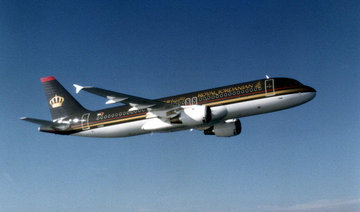JEDDAH: Thousands of passengers traveling on nonstop flights to the US from Saudi Arabia and seven other Middle Eastern and North African countries are now banned from carrying electronic devices on board.
The ban, issued by the US Department of Transportation, targets 10 international airports. It is set to exclude smartphones on board, but will apply to laptops, tablets, portable DVD players, electronic readers and cameras.
Following a similar move, the UK is due to announce a ban on laptops and other electronics on certain flights, the BBC reported, adding that the “UK restrictions may differ from the US Department of Homeland Security’s ban.”
Saudi Airlines (Saudia), which operates nonstop US-bound flights from King Abdulaziz International Airport in Jeddah and King Khalid International Airport in Riyadh, received the information from the General Authority of Civil Aviation, and will abide by the new laws as of Wednesday.
“The US transportation authorities have implemented new procedures on US-bound flights which include taking any laptops, iPads and Kindles (electronic readers), with their carry-on baggage,” Saudia said in a statement sent to Arab News. “These devices can be accepted as part of checked-in luggage only.”
Saudia spokesman Mansour Al-Badr told Arab News: “We do not know the reasons behind the ban.”
A Homeland Security statement sent by the US Embassy in Riyadh to Arab News on Tuesday said the “US Government is concerned about terrorists’ ongoing interest in targeting commercial aviation, including transportation hubs over the past two years.”
The statement cites the 2015 airliner downing in Egypt, the attempted airliner downing in Somalia last year, and the 2016 armed attacks against airports in Brussels and Istanbul.
“Evaluated intelligence indicates that terrorist groups continue to target commercial aviation, to include smuggling explosive devices in various consumer items,” the statement said. The Transportation Security Administration (TSA) has determined that it was “prudent to enhance security.”
The ban applies to nonstop flights to the US from international airports in the cities of Riyadh, Jeddah, Dubai, Abu Dhabi, Cairo, Amman, Kuwait City, Casablanca, Doha and Istanbul. About 50 daily flights will be affected, an unnamed US official told the Associated Press (AP).
The Homeland Security statement said airlines flying from the 10 determined airports were notified on March 21 at 8 a.m. (EDT) and expected to comply within 96 hours.
The UAE’s Emirates, which flies to New York, Washington, Chicago and Los Angeles, told AP on Tuesday that the ban would take effect on Saturday.
Egyptian officials at Cairo International Airport said they did not receive any instructions to ban passengers from carrying laptops, tablets and cameras on board, AP reported on Tuesday.
Royal Jordanian airlines previously issued a statement on Twitter instructing its passengers to abide by the electronics ban, before deleting it later, posting: “Further updates will be announced soon regarding #electronicsban.”
“I’m really still not convinced with this new law,” Zeina Sharawi, a Saudi Ph.D. candidate in Washington DC, told Arab News. She said using electronic devices is routine on long-haul flights, especially when flying with children.
“I’m really worried about putting my laptop in the baggage and have it get damaged or stolen, since I have all my important files and research articles, personal pictures and videos in it. I’d rather if they inspect it at the airport and keep it on board with me instead of keeping it in the baggage.”
Anas Abbas, a Jordanian studying English literature in Minnesota, told Arab News that he might resort to sending his electronic valuables via a secure parcel delivery service instead of packing them in his suitcase: “Instead of having my precious devices (checked in), as traveling without them is impossible and the chance of getting them lost is irritating… I might use DHL to receive them without any possibility of losing any bag.”
An alternative solution to bypass the new procedure is to have a layover at an airport in Europe on the way to the US. Abbas said if he is traveling from Amman, he could book a flight to Paris, for example, before connecting to a flight to the US. “That way I can get all my devices in my (carry-on) luggage.”
US bans electronic devices on flights from eight Middle Eastern countries
US bans electronic devices on flights from eight Middle Eastern countries















